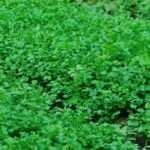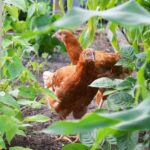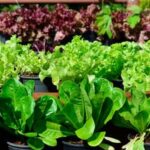Are you looking for a natural and effective way to fertilize your vegetable garden? Using horse manure for vegetable gardens can be a sustainable and nutrient-rich solution.
In this article, we will explore the benefits of using horse manure as fertilizer, how to prepare and handle it properly, the types of vegetables that thrive with horse manure, as well as the potential risks and precautions to consider. Additionally, we will delve into composting horse manure for organic fertilization, provide a step-by-step guide on its proper usage in vegetable gardens, and offer tips and tricks for maximizing its nutritional value.
Horse manure has long been recognized as a valuable source of nutrients for soil. Its high levels of nitrogen, potassium, and phosphorus make it an excellent fertilizer for vegetable gardens. Not only does it promote healthy plant growth, but it also aids in improving soil structure and water retention. By using horse manure in your vegetable garden, you are not only providing essential nutrients to your plants but also contributing to sustainable waste management.
However, before incorporating horse manure into your vegetable garden, it is important to understand how to prepare and handle it properly. Improper use of horse manure can lead to contamination and health risks. By following the guidelines provided in this article, you can ensure that you are utilizing this natural resource effectively while mitigating any potential hazards.
Benefits of Using Horse Manure as Fertilizer
Improved Soil Structure and Fertility
Using horse manure for vegetable gardens can greatly improve the soil structure and fertility. Horse manure is rich in organic matter, which helps to improve the soil’s ability to hold moisture and nutrients. This, in turn, promotes healthy root growth and overall plant growth. Additionally, the organic matter found in horse manure helps to promote beneficial microbial activity in the soil, further enhancing its fertility.
Natural Nutrient Source
Horse manure is a natural source of essential nutrients such as nitrogen, phosphorus, and potassium, which are vital for plant growth. These nutrients are released slowly as the manure breaks down, providing a steady supply of nourishment for vegetable plants over time. Unlike synthetic fertilizers, which can leach into groundwater and harm the environment, using horse manure as fertilizer provides a more sustainable and eco-friendly option for promoting healthy vegetable growth.
Reduced Need for Chemical Fertilizers
By using horse manure as fertilizer in vegetable gardens, gardeners can reduce their reliance on chemical fertilizers. This not only saves money but also minimizes the potential environmental impact associated with synthetic fertilizers. Horse manure provides a natural alternative that enriches the soil without introducing harmful chemicals or excessive salts that can build up over time. As a result, vegetables grown with horse manure often have a more robust flavor and nutrient profile compared to those grown with synthetic fertilizers.
Preparing and Handling Horse Manure for Vegetable Gardens
Collecting Horse Manure
When using horse manure for vegetable gardens, it’s important to collect fresh manure from a reliable source. Look for stables or farms where the horses are kept in healthy and clean conditions. Free-roaming horses may produce manure that contains seeds from weeds, which can be detrimental to your garden.
Composting Horse Manure
Before adding horse manure directly to your vegetable garden, it’s best to compost the manure first. Composting breaks down the manure, killing any harmful bacteria and parasites while also allowing the nutrients to become more readily available for plants. This process typically takes about six months to a year, during which time the temperature of the compost pile should reach at least 140°F (60°C) for several days to ensure that any pathogens are eliminated.
Handling and Application
When handling horse manure, it’s essential to wear gloves and other appropriate protective gear due to potential exposure to harmful microorganisms. Once properly composted, you can then apply the horse manure as fertilizer for your vegetable garden. Spread a layer of composted horse manure (about 1-2 inches) over the soil before planting your vegetables or mix it thoroughly into the soil if you’re preparing a new garden bed.
By following these guidelines for preparing and handling horse manure for vegetable gardens, you can ensure that you’re making the most out of this natural fertilizer while minimizing any potential risks associated with its use.
Types of Vegetables That Thrive With Horse Manure
When it comes to using horse manure for vegetable gardens, there are certain types of vegetables that thrive particularly well with this type of fertilizer. Here are some examples of vegetables that benefit from the use of horse manure:
- Tomatoes
- Peppers
- Cucumbers
- Squash
- Zucchini
- Radishes
- Corn
These vegetables are known for their ability to absorb and utilize the nutrients found in horse manure, resulting in healthy and robust growth. Their high nutrient requirements make them ideal candidates for utilizing this organic fertilizer.
Additionally, leafy greens such as lettuce, spinach, and kale also respond positively to the use of horse manure due to their nitrogen-rich requirements. The rich organic matter provided by the horse manure creates a fertile environment for these vegetables to thrive.
In addition to these examples, most root vegetables like carrots, beets, and potatoes also benefit from the use of horse manure due to its ability to enrich the soil with essential nutrients. However, it’s important to keep in mind that proper preparation and handling of horse manure is crucial to ensure the safety and health of your vegetable garden.
Risks and Precautions of Using Horse Manure in Vegetable Gardens
Using horse manure for vegetable gardens can provide numerous benefits, but it is also important to be aware of the potential risks and take necessary precautions. One of the main risks associated with using horse manure is the presence of weed seeds. If not properly composted, horse manure can introduce a significant amount of weed seeds into your garden soil, leading to weed infestation and competition for nutrients among your vegetable plants.
Additionally, horse manure may contain pathogens such as E. coli and Salmonella, which can pose health risks if not handled properly. These pathogens can be transferred to vegetables grown in soil amended with untreated horse manure, potentially causing foodborne illnesses when consumed. Therefore, it is essential to take proper precautions when using horse manure as fertilizer for your vegetable garden.
To minimize these risks, always ensure that the horse manure has been properly composted before using it in your vegetable garden. Composting not only eliminates weed seeds and harmful pathogens but also breaks down the manure into valuable organic matter that enriches the soil. Furthermore, thorough washing of any vegetables grown in soil amended with horse manure is crucial before consumption to eliminate any potential food safety concerns.
| Risks | Precautions |
|---|---|
| Weed seeds present | Ensure proper composting |
| Potential pathogens (E. coli, Salmonella) | Thoroughly wash harvested vegetables |
Furthermore, it is recommended to consult with a local agricultural extension office or gardening expert for guidance on the appropriate use of horse manure in vegetable gardens. By understanding and addressing these risks and taking necessary precautions, you can safely harness the benefits of using horse manure as an organic fertilizer for growing healthy and productive vegetable crops in your garden.
Composting Horse Manure for Organic Fertilization
Composting horse manure is an excellent way to create organic fertilizer for vegetable gardens. Not only does it allow for the recycling of animal waste, but it also produces a nutrient-rich material that can greatly benefit the health and yield of your crops. By following these steps, you can effectively convert horse manure into a valuable resource for your garden.
To compost horse manure for organic fertilization, follow these simple guidelines:
1. Collect the manure: Start by collecting fresh horse manure from stables or farms. Ensure that the manure is relatively clean and free from contaminants such as bedding materials or chemical residues.
2. Build a compost pile: Create a designated area in your garden or yard for building a compost pile. Layer the fresh horse manure with other organic materials such as grass clippings, leaves, and kitchen scraps to provide a balanced mix of nutrients and aid in the decomposition process.
3. Turn and aerate: Regularly turn and aerate the compost pile to promote decomposition and prevent odors. This will also help in breaking down any pathogens or seeds present in the horse manure.
By following these steps, you can create nutrient-rich compost from horse manure that will enhance the fertility of your vegetable garden while also promoting sustainability and environmental conservation. With proper composting, you can ensure that your vegetables thrive while minimizing any potential risks associated with using horse manure for vegetable gardens.
Step-by-Step Guide to Properly Using Horse Manure in Vegetable Gardens
Using horse manure for vegetable gardens can be a great way to naturally fertilize and enrich the soil, leading to healthier and more bountiful crops. However, it’s important to follow proper steps to ensure that the horse manure is utilized correctly and safely.
First, it is essential to properly age the horse manure before using it in vegetable gardens. Fresh manure can be too strong and may contain harmful pathogens that could contaminate the vegetables. By allowing the manure to age for at least six months, the high nitrogen content will decrease while beneficial microorganisms will increase, making it safer and more suitable for use as fertilizer.
Next, when applying horse manure to vegetable gardens, it’s important to do so in moderation. Too much manure can lead to an imbalance of nutrients in the soil or cause burning of the plants. A general guideline is to use about 40-50 pounds of aged horse manure per 100 square feet of garden space. This will provide enough nutrients without overwhelming the soil.
Finally, after applying the aged horse manure, it’s crucial to mix it into the top layer of soil thoroughly. This will help distribute the nutrients evenly and prevent any potential odor issues. Once mixed in, water the garden well to help integrate the manure into the soil and kickstart the fertilization process.
| Type of Vegetable | Amount of Aged Horse Manure (Lbs/Sq Ft) |
|---|---|
| Tomatoes | 5 – 0.75 |
| Lettuce | 25 – 0.5 |
| Squash | 75 – 1 |
By following these step-by-step guidelines for using horse manure in vegetable gardens, you can effectively harness its benefits without risking any negative effects on your crops or your health.
Tips and Tricks for Maximizing the Nutritional Value of Horse Manure in Vegetable Gardens
In conclusion, using horse manure as fertilizer in vegetable gardens can be an effective and environmentally friendly way to boost the growth and nutritional value of your crops. The benefits of using horse manure are numerous, including its high nutrient content, ability to improve soil structure, and support for healthy plant growth. Additionally, by properly composting horse manure, you can create an organic fertilizer that is safe for both the environment and your family.
When preparing and handling horse manure for vegetable gardens, it’s important to take precautions to minimize any potential risks. This includes ensuring that the manure is fully composted before adding it to your garden beds and following proper sanitation practices when working with animal waste. By being mindful of these risks and taking necessary safety measures, you can safely harness the benefits of using horse manure without putting your health or the environment at risk.
In order to maximize the nutritional value of horse manure in vegetable gardens, consider incorporating it into a well-rounded fertilization plan that also includes other organic materials such as compost, mulch, and cover crops. By diversifying your approach to soil fertility, you can ensure that your vegetables receive a wide range of essential nutrients for optimal growth and yield.
With careful consideration and proper handling, using horse manure for vegetable gardens can be a sustainable and effective method for promoting healthy, thriving crops.
Frequently Asked Questions
Is It Safe to Use Horse Manure in Vegetable Garden?
Using horse manure in a vegetable garden can be safe as long as it is properly composted to kill any harmful bacteria or pathogens. Fresh manure should never be used directly on edible plants.
What Vegetables Grow Best in Horse Manure?
Vegetables that grow best in horse manure include corn, squash, tomatoes, and peppers. These plants benefit from the nutrient-rich compost and organic matter provided by the horse manure.
How Long Before You Can Use Fresh Horse Manure?
Fresh horse manure should not be used in a garden as it can burn the roots of plants due to its high ammonia content. It is recommended to wait at least six months to a year before using fresh horse manure in a vegetable garden.

If you’re looking to get into vegetable gardening, or are just looking for some tips on how to make your current garden better, then you’ve come to the right place! My name is Ethel and I have been gardening for years. In this blog, I’m going to share with you some of my best tips on how to create a successful vegetable garden.





